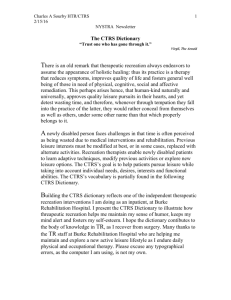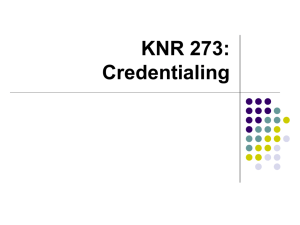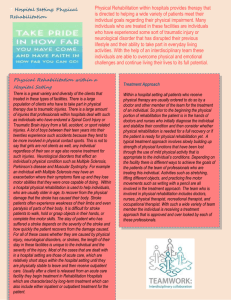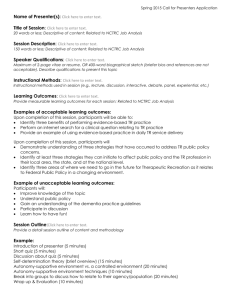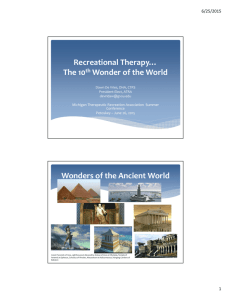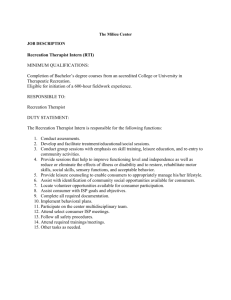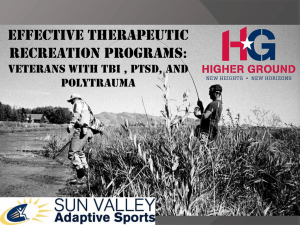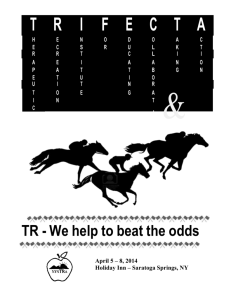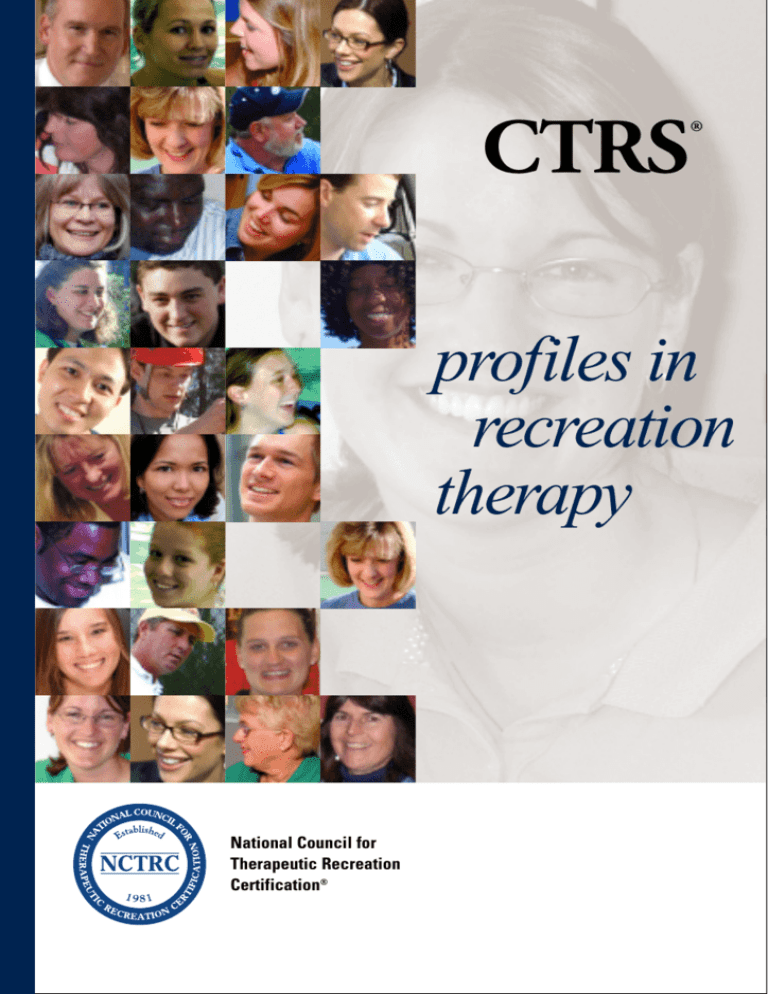
CTRS
®
profiles in
recreation
therapy
National Council for
Therapeutic Recreation
Certification®
CTRS®: Certified Therapeutic Recreation Specialist®
meet the
The CTRS is the recognized qualified provider of
recreation therapy services, combining extensive
knowledge, education, and experience to meet the
credentialing standards of the National Council for
Therapeutic Recreation Certification. CTRSs are
employed in a variety of health care and human
service settings to provide the full spectrum of
recreation therapy programs in an effort to achieve
outcomes related to health, independent functioning,
and full participation in life.
David Lee, CTRS
professionals...
Recreation Therapist
Program Coordinator
Northeast Passage
Durham, New Hampshire
10 years CTRS
Facility Type
Community-based TR
Health Promotion and
Adaptive Sports
Population
Physical Disabilities
Youth at Risk
Developmental Disabilities
The Tomasewski Family:
7 boys, 10 -17 yrs; one has spina
bifida and uses a wheelchair,
two are amputees, one is hearing
p
David Lee, CTRS: “Therapeutic Recreation
makes treatment enjoyable, as it focuses not
impaired, one has ADHD and two
have a previous medical history.
According to John Tomasewski
“With the outdoor sports which
our children do, the more they
just on activities that work but are of interest.
are up and the more they are
Many people fail to succeed at things that
doing things, the less I see them
sick or feeling bad. Therapeutic
are good for them because they find them
Recreation gives them the
not enjoyable. By making treatment enjoyable
chance to get out and interact
due to the activity’s inherent traits or the social
aspect of that activity, clients are motivated
to continue.”
with other people and each
other.”
Rebecca Crisp, CTRS
Recreation Therapist
Genesis Medical Center
Davenport, Iowa
Facility Type
Inpatient Rehabilitation
Population
Amputation
Brain Injury
Spinal Cord Injury
Stroke
Rebecca Crisp, CTRS: “Recreation Therapy
interventions are endless because we use
the patient’s leisure interests to assist
him/her in accomplishing their treatment
goals. Every session that a patient
participates in is designed to assist him/her
in improving their level of functioning.”
4 years CTRS
Bob is a patient at Genesis
Medical Center due to a recent
spinal cord injury. “A CTRS brings
something completely different to
my rehabilitation. It’s extremely
helpful not only for facilitating
cognitive change but for physical
change as well... Recreational
Therapy is a continuation of
what I’m working on in PT, OT
and Speech Therapy but in a
different way.”
Amy Davison, CTRS
Inclusion Director
Black Hawk County YMCA
Waterloo, Iowa
Facility Type
Community Agency
Population
Developmental Disabilities
10 years CTRS
Amy Davison, CTRS feels that Therapeutic
Recreation professionals are a valuable part
of the treatment team because “we can help
people apply learned skills into their daily
lives. The CTRS can work with the team to
Kaylin is developmentally
delayed due to autism. According
to her mother, during Therapeutic
Recreation programs, “Kaylin is
help the client to bring formal learning into
able to develop social skills and
informal settings.”
to show other kids that she is
not so different from them. The
programs that she can participate
in give her an opportunity to
enjoy not being so special.”
Rodney Jackson, CTRS
Lead Recreation Therapist
Central Arkansas Veterans
Healthcare System
North Little Rock, Arkansas
Facility Type
Mental Health Service
13 years CTRS
Population
Psychiatric/Mental Health
Kathleen Harris, CTRS:
“Recreation Therapy assists
the patient to become more
independent and provides them
the opportunity to practice
critical skills out in the community.”
q
p
Rodney Jackson, CTRS: “The value of employing
and supervising Certified Therapeutic Recreation
Specialists is a vital part of innovative patient
care. A CTRS requires less supervision and has
p
the support of a treatment team to provide clinical
John, VAMC patient: "The community
outcome driven care without the stigma of being
re-entry outings taught me that I can
accept certain crowded conditions
without undo stress. I am confident
that as I leave the program and return
home, I will continue to benefit from
the techniques and guidance that I
learned through recreation therapy."
an ‘activities person’. At the Central Arkansas
Veterans Healthcare System, the important work
of our Recreation Therapy staff (CTRS) means
improved quality of life for our hospitalized
veterans!”
William Frazier, CTRS
Director of
Therapeutic Activities
William Frazier, CTRS: “I enjoy being a CTRS
because it indicates that I have demonstrated
a higher level of professional competency.”
William feels that the direct outcomes of
Therapeutic Recreation are the most important
factor. William states: “The quality of life for the
Laguna Honda Hospital
& Rehabilitation Center
San Francisco, California
Facility Type
Long-term Care
Rehabilitation
Population
Geriatrics
Psychiatric/Mental Health
Physical Disabilities
residents is significantly enhanced through the
efforts of the Activity Therapy Department.”
q
26 years CTRS
Bob, a 16-year resident
of Laguna Honda
Hospital, talks about the
constant encouragement
from the CTRS: “The
most outstanding benefit
that I have embraced
was the development of
the creative ability to
paint with my left hand
after losing the functional
and physical use of my
right hand due to the
advancement of Multiple
Sclerosis.”
t
NCTRC: Dedicated to Professional Excellence
Established in 1981, the National Council for Therapeutic Recreation Certification (NCTRC) is
a non-profit, international organization dedicated to professional excellence for the protection
of consumers through the certification of recreation therapists. Professional recognition is
granted by NCTRC to individuals who apply and meet established standards for certification,
including education, experience, and continuing professional development. The Certified
Therapeutic Recreation Specialist (CTRS) credential is offered to qualified individuals based
on these stringent requirements.
NCTRC supports quality human service and health care standards and maintains recognition
by the Joint Commission for the Accreditation of Healthcare Organizations (JCAHO) and the
Commission for Accreditation of Rehabilitation Facilities (CARF). NCTRC provides credential
verification services to employers and health care agencies. These services are strongly
encouraged by NCTRC to monitor personnel adherence to the standards of the Certified
Therapeutic Recreation Specialist.
NCTRC is a charter member organization of the National Organization for Competency
Assurance (NOCA). NCTRC is accredited by the National Commission for Certifying
Agencies (NCCA).
For more information about NCTRC and to review current certification
standards refer to our website at www.NCTRC.org
National Council for
Therapeutic Recreation
Certification
7 Elmwood Drive
New City, New York 10956
Tel 845-639-1439 l Fax 845-639-1471
email nctrc@NCTRC.org
www.NCTRC.org
NCTRC does not warrant or guarantee the provision of competent services by CTRSs; NCTRC certification helps to demonstrate the certificant has met the requirements for the profession.
CTRS is a trademark of the National Council for Therapeutic Recreation Certification "NCTRC®", "National Council for Therapeutic Recreation Certification®", "CTRS®" and "Certified
Therapeutic Recreation Specialist®" are the trademarks of the National Council for Therapeutic Recreation Certification. All rights reserved 2007.
© 2007 NCTRC®. All rights reserved. Copying and distribution in any medium is prohibited without prior NCTRC® written consent.


